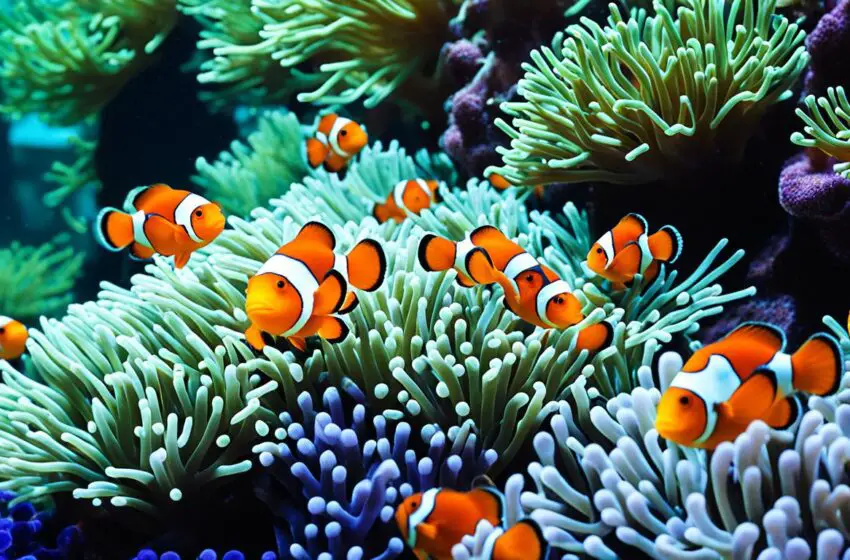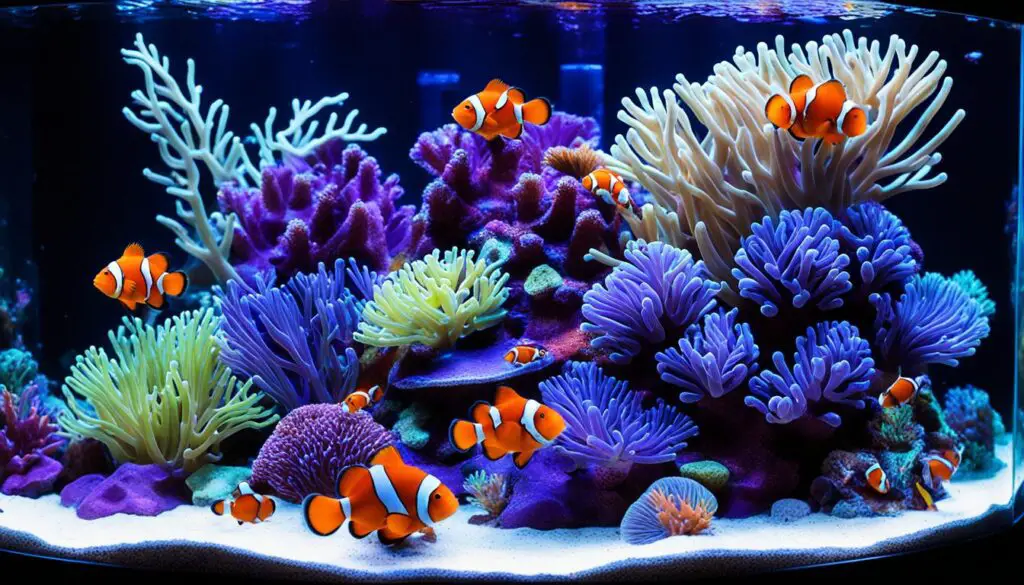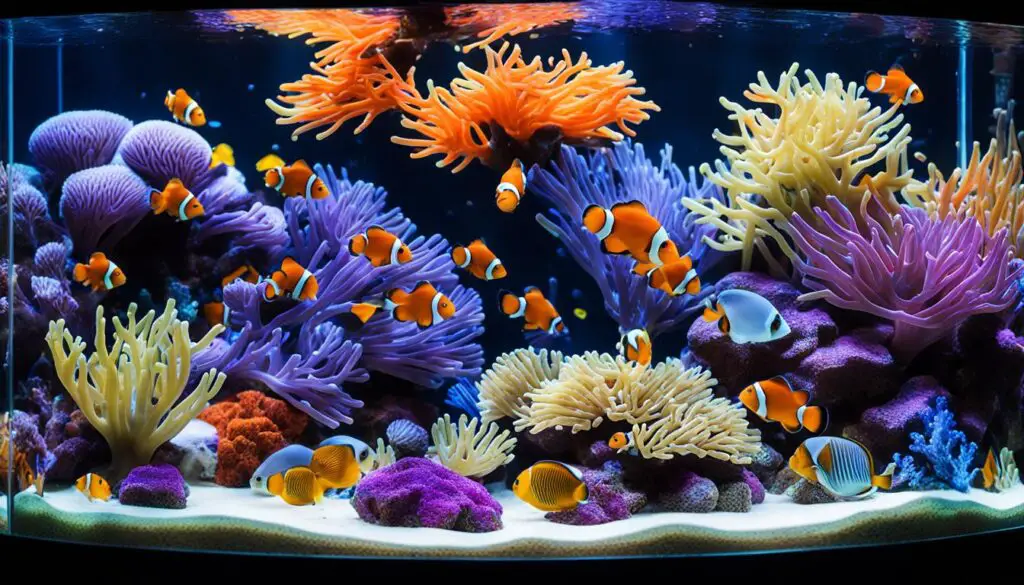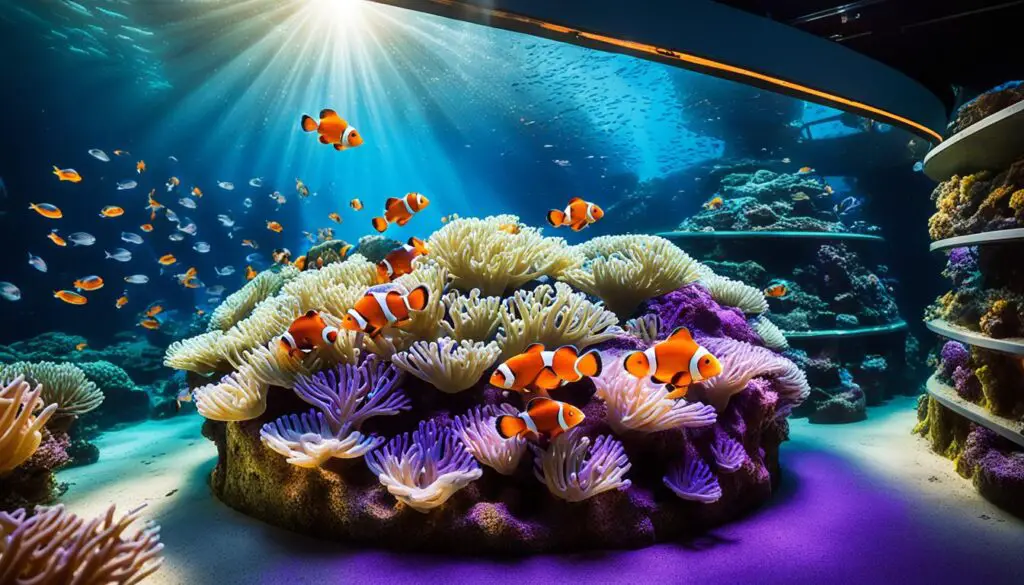Participate in Clownfish Tank Conservation Projects Today!

Welcome to the world of clownfish tank conservation! As you dive into this fascinating realm of wildlife protection, you’ll discover the mesmerizing beauty and significance of these oceanic gems. The Coral Reef Conservation Program, in collaboration with NOAA Line Offices, is dedicated to comprehending and safeguarding coral reef ecosystems, including the vibrant clownfish populations that inhabit them.
Did you know that over 1 million clownfish are extracted from the wild each year? This staggering number emphasizes the urgent need for conservation efforts to preserve these enchanting creatures, their habitats, and the delicate balance of marine ecosystems as a whole.
That’s where Saving Nemo comes into play. This organization is committed to clownfish conservation. They use education, research, and responsible breeding practices for the aquarium industry. By donating or getting involved with their programs, you can help with vital research and educational efforts. The goal is to stop taking clownfish from the ocean.
Key Takeaways:
- Participate in clownfish tank conservation projects to protect these captivating oceanic gems.
- The Coral Reef Conservation Program focuses on understanding and conserving coral reef ecosystems, including clownfish populations.
- Over 1 million clownfish are taken from the wild annually, highlighting the importance of conservation efforts.
- Saving Nemo is dedicated to clownfish conservation through education, research, and responsible breeding for the aquarium industry.
- Your support, whether through donations or spreading awareness, can contribute to the preservation of clownfish and their habitats.
Get Involved in Clownfish Tank Wildlife Protection
Clownfish and their habitats need our help to stay safe. It’s very important to protect them. You can help in many ways:
Volunteering Opportunities
Volunteer spots might not be open right now. But, you can keep in touch and ask about chances later on. Stay connected with groups like Saving Nemo. They’ll let you know how to help.
School Programs
Having marine biology at your school can help teach everyone about clownfish. This includes why they need our protection and how we can help them. If you’re interested, email Karen Burke da Silva at [email protected]. She can talk to you about fun and interesting programs.
PhD Opportunities
Are you into research and marine life? Think about a Ph.D. in marine biology. You can find schools and groups working on helping clownfish. Look for Ph.D. chances that fit what you like and want to do.
Consumer Choices
Buying the right fish can make a big difference. Try not to buy wild clownfish from stores. Most marine fish there come from the wild. Instead, choose clownfish that are born in safe places. This supports their wild friends.
For more on this and how to choose right, check out trusted websites. They share tips on the best way to number, number aquarium fish.
Spreading Awareness
Tell others about Saving Nemo. Use your voice and the web to talk about clownfish. Share cool facts, videos, and ways people have helped. It can get others excited to pitch in.
Contributions
Helping goes beyond just talking about it. Give money or stuff to groups like Saving Nemo. Your help lets them do more to protect clownfish.
Your small actions really add up. Help by volunteering, learning more, making good choices, telling others, and giving what you can. This helps protect clownfish and their homes for the future.
Hawk Conservancy Trust and Global Conservation Work
The Hawk Conservancy Trust, located in Andover, England, focuses on bird of prey conservation and research. We work globally, teaming up with organizations worldwide. Our goal is to protect these amazing birds everywhere.
Our approach to bird conservation covers many areas. We study these birds and their homes, learning about their challenges. This knowledge helps us create strong plans to save them and their environments.
Education is key in our work. We teach people about birds of prey to build love for them. This way, we encourage everyone to help in their conservation. We provide learning opportunities for people of all ages to protect nature.
We also take care of injured or orphaned birds. By helping these birds recover and then releasing them, we help their numbers and homes. Our team and everyone who supports us play a vital part in the life of these birds.
FAQ
How can I get involved in clownfish tank conservation projects?
Want to help with clownfish conservation? Even though there might not be volunteer spots now, ask about future chances. You can also help by getting marine biology programs in your school. Email [email protected] for details.
If research sparks your interest, there are PhD spots out there. Also, please don’t buy wild clownfish. Around 90% of fish in aquarium shops are caught from the sea. To make a good choice as a consumer, learn more about saving clownfish.
Lastly, share info about Saving Nemo. You can also help by donating equipment or offering professional help to support their work.
What does the Hawk Conservancy Trust focus on in terms of conservation work?
The Hawk Conservancy Trust in Andover, England, works on bird of prey conservation globally. They connect with conservation groups everywhere for research, teaching, and helping birds of prey recover. Their goal is to show how important these birds are and the issues they deal with.
By backing the Hawk Conservancy Trust, you’re supporting efforts to protect these birds and their homes.



